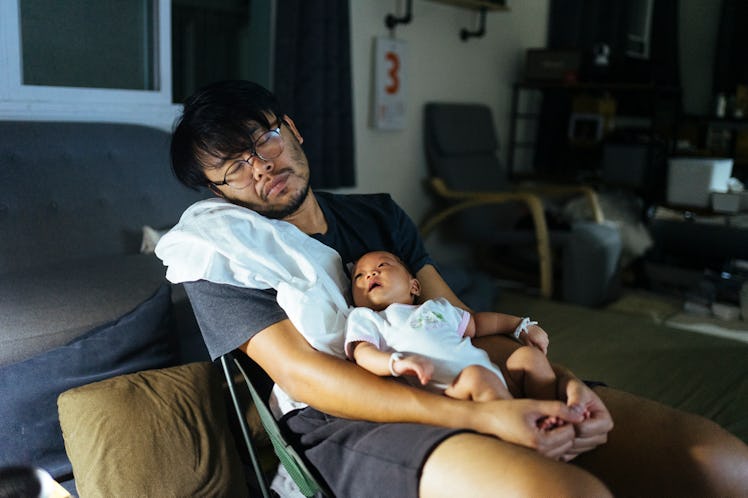How Long Does It Take New Parents To Catch Up On Sleep?
That depends on how long you want to live like this.

Sleep-deprived parents don’t even know how sleep deprived they are, according to sleep consultant Conner Herman. Herman, who’s a parent of four, says she only recently felt fully caught up on sleep herself. Before that, she remembers being amazing that anyone had the energy for anything. “How did you decide to get up and go for a walk? Aren’t you tired?” Herman, the co-founder of the Dream Baby Team and co-author of The Dream Sleeper, jokes about her exhaustion. But there’s hope at the end of the gradual road to rest recovery, she adds. “You wake up one day and want to go for a walk again.”
Sleep deprivation, to some extent, is an inescapable aspect of parenthood. Parents of newborns can lose up to two hours of sleep per night in the first five months of their child’s life, physician and sleep specialist William C. Dement estimates, and then about one hour per night after that. Other research estimates that, within that first year, you lose a total of 44 days worth of sleep. Part of that is because you’re hardwired to respond with an adrenaline rush whenever your baby cries. But it doesn’t help that, even after you’ve soothed your baby, distractions like your smartphone loom nearby.
With support from a partner (and frequently with help from professionals), it will take parents at least four additional months to catch up on the sleep lost in those first five months. Which means that, at best, you’re not going to be back to normal until your baby is at least 9 months old.
And that’s only a rough estimate, which doesn’t account for the sleep that pregnant people lose in the third trimester, or for the sleep you’ll lose when your baby refuses to submit to sleep training. When parents fail to wean their children off night feedings as recommended, it can take up to a year to recover. “It’s really hard to quantify because it’s not about losing sleep — it’s about the quality of sleep,” Herman says.
But when parents buckle down and let their babies know that their cribs are safe and it’s okay to sleep through the night without food, sleep will soon follow. As will a certain sense of pride in what will likely be your first win. “It’s the first time you believed in something your kid didn’t know they could do, and then they did it,” Herman says. “Then you have respect for them, and they have trust in you.”
The biggest challenge for parents (outside of actual parenthood, which is pretty hard) is resisting the temptation to muscle through their kid’s infancy without sleep. Because when you’re exhausted, you’re not the best parent you can be. And it’s only a matter of time before that catches up with you.
“Everybody can be not their best self for a period of time,” Herman says. “But therapists aren’t teaching us to forgive our parents because they’re sleep-deprived.”
This article was originally published on